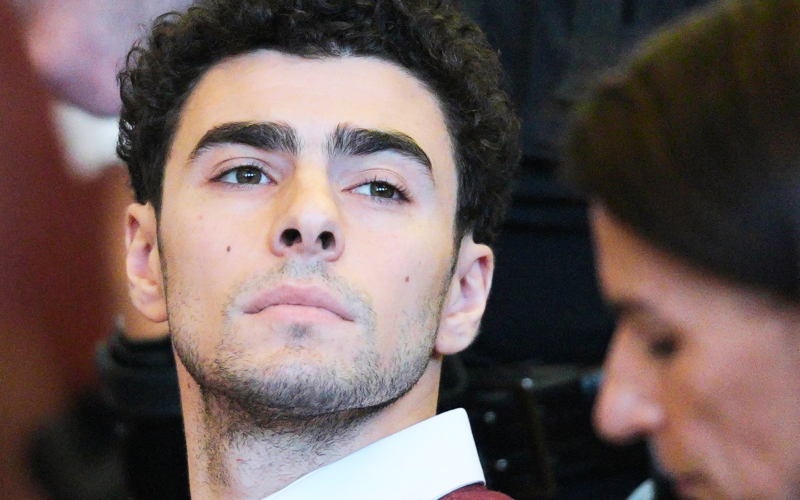In a striking development, a local news outlet in Tampa Bay has brought attention to the ongoing healthcare crisis in the United States through its coverage of the case involving Luigi Mangione. The segment not only discusses the allegations against Mangione, who is accused of killing United Healthcare CEO Brian Thompson, but also sheds light on the broader issues surrounding health insurance in America. This unexpected focus on healthcare injustices by local news media has sparked conversations about the treatment of patients by insurance companies, revealing the interplay between individual suffering and institutional negligence.
Luigi Mangione stands accused of murder and terrorism in connection with the death of one of the CEO:s of the biggest health insurance company. If convicted, he faces severe penalties, including a potential death sentence The case has drawn significant public attention, particularly due to the high-profile nature of the victim and the circumstances surrounding Luigi Mangione.
What makes this case even more compelling is the emotional reaction it has elicited from the community. A senior citizen from St. Petersburg, who has experienced firsthand the struggles of dealing with insurance companies, shared his story during the news segment. His claim for necessary medical treatment was denied by his Medicare Advantage insurance provider, a situation that resonates with many Americans who feel trapped in a system that prioritizes profit over patient care.
Voices of victims
The local news segment featured an interview with James Taylor, a former bodybuilder and powerlifter, who has been battling a debilitating back injury. He expressed his frustration over his insurance company’s refusal to cover the surgery recommended by his doctor. Taylor’s story is a poignant reminder of the real-life consequences of insurance company policies. He articulated the pain of being denied necessary treatment and the subsequent reliance on prescription opiates, which he described as a cheaper alternative for the insurance company.
His comments struck a chord, as he likened Mangione’s actions to those of a modern-day Robin Hood, suggesting that there is an underlying anger among the public towards the wealthy and powerful, particularly in the context of healthcare. Taylor’s narrative underscores the growing discontent with how insurance companies operate, prioritizing their profits while patients suffer.
The Reaction on Social Media
Social media reactions to the news segment further illustrate the public sentiment surrounding this case. When United Healthcare posted a memorial for Brian Thompson on Facebook, the response was overwhelmingly negative, with many users expressing their disdain through laughing emojis. This reaction highlights a significant disconnect between the insurance companies and the very individuals they are supposed to serve.
Interestingly, this reaction came from a demographic that typically supports the status quo, suggesting that even those who might traditionally defend such institutions are beginning to question their practices. The conversation surrounding healthcare is shifting, and the segment has played a crucial role in amplifying these discussions.
The Broader Implications
It’s clear that the issues at play extend far beyond the individual cases being highlighted. The conversation has surfaced larger questions about the structure of the American healthcare system and the role of insurance companies in determining what constitutes necessary care. The segment on MSNBC further elaborated on these systemic issues, illustrating the confusion and frustration many face when trying to navigate their medical bills.
Healthcare costs in the U.S. have skyrocketed, and many patients find themselves battling their insurance providers just to receive basic medical care. The segment discussed how profit-driven motives lead to denials of care, leaving patients in precarious situations. This has become a critical issue for many Americans, leading to a rise in bankruptcy due to medical bills and highlighting the urgent need for reform in the healthcare system.
Jury Nullification and Public Sentiment
Another intriguing aspect of the discussion is the concept of jury nullification. The idea that a jury could choose to disregard the law if they believe that the circumstances warrant it raises questions about how society views actions taken in desperation against oppressive systems. In Mangione’s case, there is a possibility that jurors may empathise with his situation, given the broader context of healthcare injustices being discussed.
This sentiment reflects a growing awareness among the public about the failings of the healthcare system. The fact that healthcare has surged to the forefront of public concern indicates a shift in priorities, urging lawmakers and society to take action.
Call for Change
The coverage surrounding Luigi Mangione’s case shines a spotlight on the deep-seated issues within the American healthcare system. As more people begin to share their experiences and frustrations, it becomes clear that the current system is unsustainable. Throughout, local news and social media alike serve as a catalysts for important conversations about healthcare reform, highlighting the need for a more compassionate and equitable system.
As the dialogue continues, it is crucial for both the media and the public to advocate for changes that prioritise patient care over profits. The stories of individuals like James Taylor remind us that behind the headlines are real people suffering from systemic failures. It is time for a collective effort to address these injustices and create a healthcare system that truly serves the needs of all Americans.
Discover more from Dotly
Subscribe to get the latest posts sent to your email.

